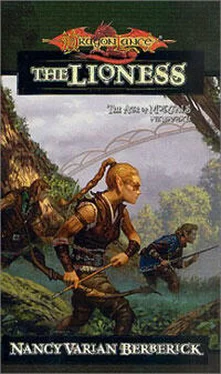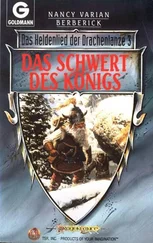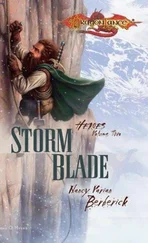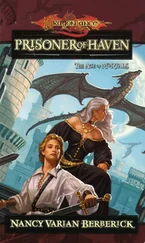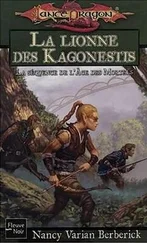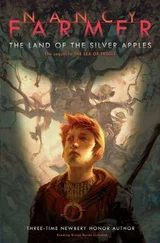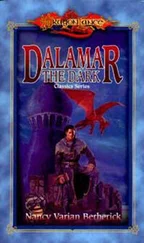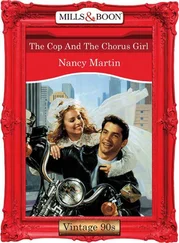The elf woman screamed. Her voice soared high above all the rest; her face shone white in the night as she clutched her child to her breast. Howling, five Dark Knights ringed her round, circling, swords high, laughing. One howled higher than all, and one kept starkly silent. She fell to her knees, bent over the child, the little creature wailing in her arms against her breast. A voice shouted “Erathia!” A sword screamed through the air, and the voice did not shout more. Erathia wailed, knowing her husband dead, knowing his head would join the heads of other murdered elves.
Horses thundered round her, Knights yelling madly.
Erathia prayed to a goddess long fled the world, she prayed to Mishakal, the giver of mercy elves named Quenesti-Pah.
“Merciful goddess, lady of light, spare my child, oh spare—”
Beside her face, so close the iron shoe ran red with firelight, a tall war-horse stamped and grew still. Around her, the others did the same. Erathia had heard no command, but these Knights had a Skull Knight for a lord. There had been a command.
Trembling, she hunched lower over her child and realized she heard nothing of elf voices. No villager wept, howled, or pleaded.
Gods, she was the last.
“Merciful Lady …”
She looked up, and two Knights departed from the circle around her; two came close, one on either side. They wore their helms closed, and that didn’t matter. Erathia knew which was the Skull Knight. From him, his very being, flowed the coldness of death, like a wind out of winter, belling in the forest, howling in her heart. He flung back the visor of his helm. The other mirrored the gesture.
“Headsman,” he simply said.
She looked to them, to one and the other, the agents of her death. In the eyes of the Skull Knight she saw nothing, not a killing lust, not hatred, not even determination to get the job done. Nothing, as though she looked into the windows of an empty building, into blackness. In the eyes of the other, Chance Headsman, she saw fire. Flames leaping, consuming, bloodlust and killing-need.
In his eyes she saw her death, the raising of his blade before he lifted it, the fell swing before he caused it. She screamed, flung herself aside, and there was nowhere to go. A horse jostled her, and the child fell from her arms, wailing.
Whistling, the sword of Chance Headsman swooped low. She looked into the eyes of the Skull Knight, perhaps to plead. In the moment of her death, the moment the blade kissed her neck, she saw a thing happen in those eyes. They kindled with sudden savage joy.
The season of Autumn Harvest began in woe, and grief ran through it like a river of blood. Sorrow rained upon the forest in that season once known for joy, and the fires lighting the night were not the traditional harvest bonfires. No one danced round these, laughing girls and lusty lads. No one shouted for the joy of the harvest; no one cried out thanks.
They wept before these fires, elves pared to bone by their grief, their voices fit only to keen and moan.
A pall of smoke hung over the land, drifted like the ghosts of the dead between the trees. Looking, a person would have thought all the forest had been put to the flame. It had not been, but villages burned. Farmhouses, barns and byres, and the neat stacks of hay in the fields—these all burned.
For two weeks, the Speaker of the Sun watched from the highest point in the city, from the gardens on the roof of the Tower of the Sun. He stood alone on some nights, watching, and thinking. It is she. Kerian is back!
Once he said this to his mother, Laurana standing beside him and tracking the fires. She asked him how he knew this, and he said, “Mother, think like a general. Before, Thagol went here, and then he went there. You could imagine his next blow only looking at a map. Look now—over the last nights we’ve seen no pattern at all. He is chasing someone. He’s chasing Kerian.”
Laurana considered this, looking out past the bridges, the eastern one bristling with the skulls that marked Thagol’s rage. They gleamed now in the moonlight, bleached by the seasons.
“What is she doing, my son?” she asked, her voice heavy with sadness.
Gilthas didn’t know, and he said so. “I do know Kerian, and so I think she’s engaging him, Mother. I think she’s jerking him wherever she wants him to be. I would guess that she’s drawing him north and eastward.”
“Toward the Stonelands.”
“Yes. Thorbardin, beyond.”
“Thorbardin.” Laurana stood a moment quiet, and at last she gave voice to the question between them. “If Kerian is back, why hasn’t she come here to tell us how her mission to the dwarves fared?”
Gilthas pointed to the fires by which they tracked her. “I don’t think she’s had time to, Mother.”
Wind shifted, smoke stung their eyes, and in the stinging Gil’s sudden bravado shivered. With startling suddenness, he recalled the nightmares that lately haunted him. In those dark dreams he sent his lover to her death. He put a hand upon the parapet to steady himself. Had he doomed her in reality?
Soft, his mother’s hand touched his shoulder, an old gesture, a steadying one. She said nothing, not she who felt the deaths of those in the forest, she who had raised up a son whose nights were often savaged by dreams that looked sometimes like prescience.
Gilthas shook his head, swallowing to steady his voice.
“There is reason to hope, Mother. I don’t know why she hasn’t come here. There are ways to reach her, but I won’t try those now. Whatever Kerian is doing, she does for a reason. The wrong move from me, and I might cause it all to fall in ruin.”
Warm breezes, smoky and thick, tugged at Laurana’s hair as she leaned out over the marble wall framing the little garden. She leaned out to see. Gilthas knew her and knew she did not strain only her eyes to see. She looked with her heart, with all her mind. What was happening in the kingdom? How many more would have to die?
“Mother,” said the elf king. He took her hand and put it in the crook of his arm. “Come away now. We’ll trust her. Whatever Kerian is doing, she is doing her best. As for Thorbardin, we must trust about that, too. She spoke well there and was heard, or she spoke well and wasn’t. We must wait and see.”
For she will not forget. She will come to me, he thought, looking out to the smoky night.
For another fortnight, the king went up to the roof to watch the forest. On almost every night, he saw the signs of burning, smoke hanging. To his city came news that the winter to come would be a hard one. Sir Thagol did not know the meaning of mercy, and he seemed to hate the crops of farmers as much as he hated farmers themselves. In the halls of elven power, Senator Rashas looked around at his fellows nervously, hearing their unease, their fear, and he grew afraid they would recall that he had been the greatest champion of the idea of Beryl’s Dark Knights doing all they could to bring order to an unruly kingdom.
“An orderly kingdom,” he’d argued, “will produce all the tribute the dragon wants. She will thrive, and we will survive. It is the only way!”
Now as his fellows looked out into the forest and marked the smoke, they heard the cries of the people who feared that the winter would be a hungry one, and they began to look at Senator Rashas with narrowed eyes.
“This had better end soon,” said Lady Sunstrike, who held lands out by the eastern part of the kingdom, in sight of the Stonelands. She had received her governorship from the hand of the young king. She had spoken with him lately, the king who sat upon his throne with his usual air of disinterest. To see him, anyone would think he was half asleep. Lady Sunstrike believed otherwise. “If it doesn’t end, we will be wondering what to do with the hungry when the snow comes.”
Читать дальше
